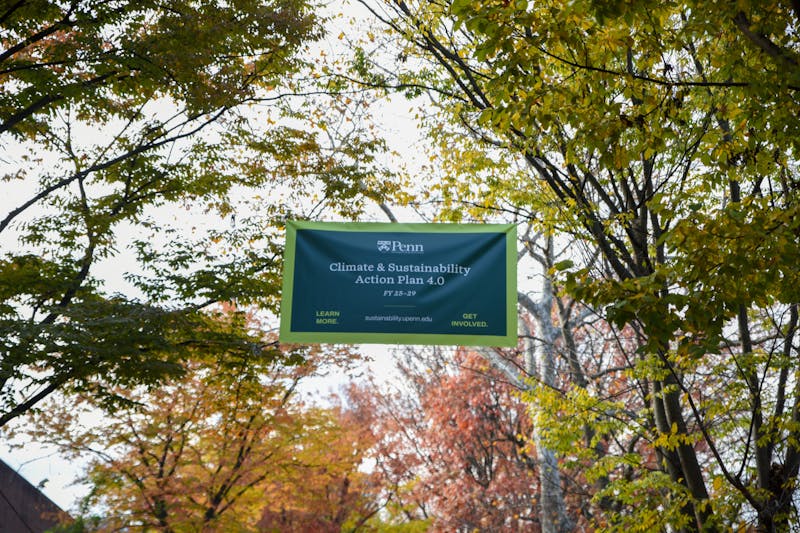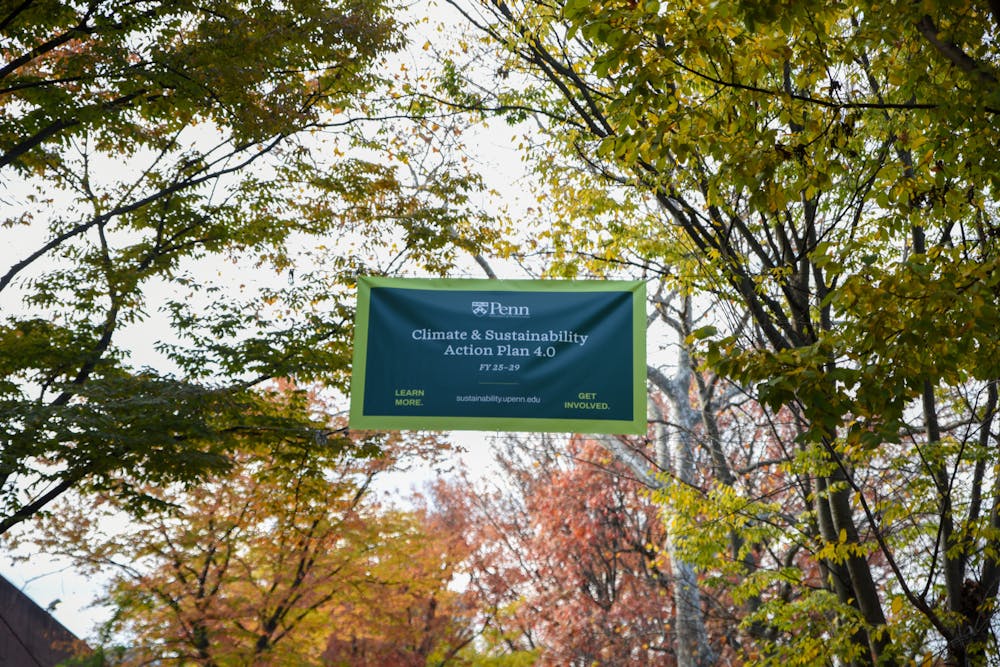After launching the Climate and Sustainability Action Plan 4.0 in 2024, Penn Dining has initiated its shift toward “near-zero waste.”
Credit: Chenyao Liu
As Penn Dining initiates several interconnected sustainability initiatives following the 2024 release of the University’s Climate and Sustainability Action Plan 4.0, The Daily Pennsylvanian spoke with the division about how its team is working to meet its “near-zero waste” goals.
Every day, Penn Dining serves 12,000 to 15,000 meals across its residential dining, retail, and catering department, with operations ranging from food sourcing and preparation to waste management. Across its vast scale of operations, Penn Dining, the University’s on-campus food service department, and Bon Appétit, the catering company that partners with Penn, are taking steps to adopt sustainable practices and embrace environmentally friendly policies.
How Penn Dining collects data and analyzes metrics
One goal laid out in CSAP 4.0 is to “[p]ilot zero-waste operations in at least one residential dining hall and begin a phased transition to require all providers to operate zero-waste residential dining halls.”
In pursuit of this objective, Penn Dining is piloting a program at Quaker Kitchen this year that Bon Appétit Regional Sustainability Coordinator Elise Dudley characterized as striving for “near-zero waste.” If the plan “goes well,” the division intends to expand the initiative to other residential dining facilities in the future, according to Penn Dining Associate Director of Operations Thomas MacDonald.
In a statement to the DP, Business Services Director of Communications and External Relations Courtney Dombroski wrote that Penn is interested in expanding the effort to Falk Dining Commons in Steinhardt Hall.
“Because Falk operates under kashrut—Jewish dietary laws that guide how food is prepared and served—we may not be able to fully meet all of the zero-waste guidelines in that space,” Dombroski wrote. “That said, we are committed to working within those parameters to identify opportunities to reduce waste wherever possible.”
Dudley expressed optimism regarding the feasibility of all residential dining halls getting to a zero-waste status.
“I do believe it’s achievable,” Dudley said to the DP. “We’re already on track just because of the commitments that we have around waste management on campus.”
Penn Sustainability’s Student Eco-Reps — an environmentally focused leadership cohort of undergraduates — are working with Bon Appétit to collect data on food waste at Quaker Kitchen and other dining halls, and to develop solutions to address zero-waste obstacles.
Dudley stated that the team will focus on “better understanding post-consumer food waste” by collecting data and then “implementing some interventions to try to reduce [it].” From there, Dudley said that the Eco-Reps will “do an inventory of all the other residential dining locations.”
Penn participates in the Sustainability Tracking, Assessment, and Rating System, an assessment run by the Association for the Advancement of Sustainability in Higher Education that tracks sustainability performances at colleges and universities. Penn has a rating of “gold” — the second-highest category — according to its STARS report.
The dining team also meets regularly with Penn Sustainability and campus stakeholders to discuss CSAP 4.0 implementation and goals. It also tracks and reports quarterly purchasing data to Penn Sustainability, which informs their “scope 3 emissions tracking and nitrogen footprint analysis,” according to Dudley.
Plans to leverage data into action
One project under consideration is a Green Fund at Houston Market, a customer-facing compost collection approach modeled after an existing scheme at Joe’s Café. The initiative — a joint effort between the Undergraduate Assembly and Penn Sustainability — would be overseen by Bon Appétit Director of Retail Dining Daniel Wideman.
The Environmental Sustainability Advisory Committee — a group of faculty, staff, and students that advises the President — also has a single-use plastics subcommittee that is working with different vendors to move away from plastic towards aluminum bottles.
“The transition is underway,” MacDonald told the DP. “It’s a little hard to get aluminum water bottles at this point in this market. But we can recycle aluminum … much better than plastic, and that’s a goal that we’re working towards.”
Green also discussed Penn Dining’s Green2Go, a reusable to-go box program available to students. Last September, Green2Go partnered with the app Reuzzi to increase their container return rate, which has since climbed to 97%.
“In the past, we faced challenges with the Green2Go program and receiving back the containers. At times, we ran out of containers and had to switch to using single-use fiber containers,” Green said. “[Since] we instituted the app Reuzzi, we have found a vast reduction of challenges with running out of Green2Go containers.”
In the past year, nearly 13,000 Green2Go container transactions were recorded, with a monthly average of 500 students utilizing the program. The program has prevented 6,588 pounds of carbon dioxide emissions, according to a statement from Dombroski.
Penn Sustainability intern and graduate student in environmental studies Jason Klein, who recently led a New Student Orientation program surrounding waste and recycling, said he thought the Green2Go program was still “something that could be improved.”
“Some of the students [in the Student Advisory Group for the Environment], when we were talking about Green2Go, [said] they thought it didn’t exist anymore,” Klein said to the DP. “I think that it needs to be marketed more.”
In the future, Penn Dining aims to lower its climate impact on the operations side through efforts such as setting purchasing guidelines for dining equipment and incorporating innovative disposal systems. The decision will follow these climate-friendly strategies in the upcoming 1920 Commons Renovation project.
How food arrives at Penn
A key component of Penn Dining’s waste-reduction efforts is sustainable sourcing, which helps reduce climate impact before food reaches the kitchen.
One key factor driving decisions on what ingredients to purchase is what is on the menu in a given week, which is driven both by student and guest input and Penn Dining’s “plant-forward menuing” philosophy.
“We have surveys. A lot of that survey information is used to write the menus, and then we are sourcing things under strict guidelines that Bon Appétit has created for their food standards,” Green said to the DP.
He added that “many” of these ingredients come from local farms and purveyors, which must meet certain established thresholds of local vendor sourcing.
The Penn Dining team has also set “purchasing commitments” that include considerations of humane certifications and fair trade practices.
“Our kitchen philosophy [is] serving food that’s prepared from scratch … alive with flavor and nutrition, which we achieve through buying the freshest local ingredients,” Dudley said. “It’s always our first choice to then source in a socially responsible manner.”
Penn Dining’s culinary team practices “plant-forward cooking,” which emphasizes plant-based foods, according to Dombroski. She emphasized that Penn Dining offers plant-based options at every facility, resulting in more than 59% of food purchases in 2025, by weight, being plant-based products.
What happens after plates are scraped
Underlying the two new campus pilot projects is a comprehensive waste-management system designed with sustainability in mind.
According to Waste Not, Bon Appétit’s internal waste-tracking platform, 92% of food waste was sent to be composted at a local facility operated by Bennett Compost in Northeast Philadelphia, with 7% sent to a landfill and 1% to food recovery. During the 2024-25 academic year, the division stated that it had diverted an average of 21.5 tons of waste per month away from landfill and towards composting.
Sign up for our newsletter
Get our newsletter, DP Daybreak, delivered to your inbox every weekday morning.
“We have a provider on campus that provides us with compost totes,” Green said. “We fill those totes with compostable food scraps and waste, and they pick up those totes regularly.”
Penn’s hierarchy of preferred waste-management methods mirrors the Environmental Protection Agency’s Wasted Food Scale, with landfill as the “last preference.”
Penn’s kitchens also employ a preventative “batch cooking” method to prevent waste creation. Any leftover food at the end of a day is sealed, labeled, and frozen, according to Green. Bon Appétit then connects with a food donation source to donate the extra products at the end of each semester.
The Daily Pennsylvanian is an independent, student-run newspaper. Please consider making a donation to support the coverage that shapes the University. Your generosity ensures a future of strong journalism at Penn.

